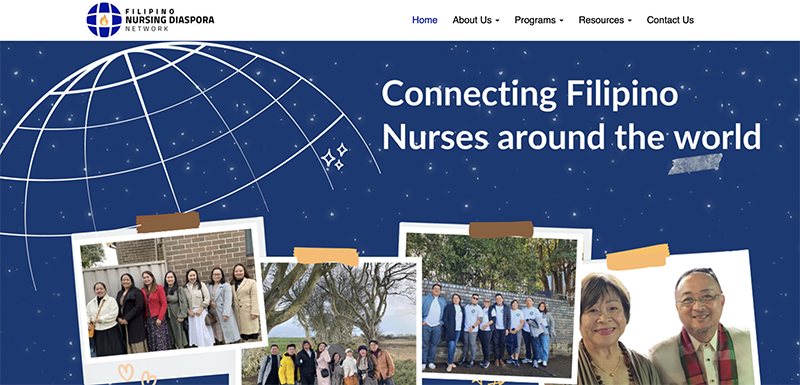2024: A Landmark Year for Filipino Nurses Globally

Clockwise (starting from right) Maria Victoria Juan, Jose Castillo III, Edmund Tabay, Manu Pelayo, Leo Felix Jurado, and Karissa Subedi.
Among the remarkable achievements we celebrated was Manu Pelayo’s election as Deputy Chairperson of the Board of the Nursing Council of New Zealand, marking the first time a Filipino has held such an influential post. His role transcends mere representation; it speaks to the impact of Filipino nurses in regulatory and governance spheres. For years, Filipino nurses have shouldered heavy responsibilities in patient care yet were rarely recognized in decision-making circles. Manu’s position now symbolizes a deeper integration of our cultural perspectives into the nursing standards and policy framework.
In the United Kingdom, we applauded Edmund Tabay, who became the second Filipino Chief Nursing Officer (CNO) in the National Health Service. Building on last year’s milestone when Oliver Soriano was appointed the first Filipino CNO, Edmund’s elevation is not a one-off. Instead, these achievements reflect a broader acceptance of the leadership skills Filipino nurses bring, skills honed through rigorous clinical practice bolstered by empathy, cultural awareness, and teamwork. The FiND Network confirmed that the right mentorship and support can propel Filipino nurses into strategic positions where they can influence policy, manage complex operations, and mentor others.
Across the Atlantic, in the United States, Dr. Jose D. Castillo III became president-elect of the National Council of State Boards of Nursing (NCSBN), the first Filipino to assume this key position. Five other Filipino nurses also joined various state nursing boards. Such developments echo a theme I have long championed at FiND: Filipino nurses must be part of regulatory and policymaking apparatuses. Being “at the table” means shaping licensure, educational requirements, and practice standards, and acknowledging diverse cultural experiences, including those of migrant nurses.
Meanwhile, Karissa Subedi made history as the first Filipino nurse elected to the Wagga Wagga City Council in Australia. Though seemingly removed from the clinical setting, her victory aligns with our belief that leadership in public service is an extension of nursing’s core ethos. Nurses understand community well-being at a fundamental level, and this understanding can translate powerfully into government roles.
Beyond appointments and elections, the year was also marked by significant honors. Maria Victoria Juan received the Aster Guardians Global Nursing Award 2024—an international nod to the caliber of care and innovation Filipino nurses offer. The Philippine Nurses Association of New York (PNA NY) and Dr. Leo Jurado were also recognized with the 2024 Presidential Award for Filipino Individuals and Organizations Overseas (PAFIOO). I see these accolades not as isolated achievements, but as part of a collective narrative, affirming that our community’s contributions resonate worldwide.
FiND aims to empower Filipino nurses by fostering a community of excellence, leadership, and mutual support. The milestones of 2024 underscore the significance of this mission. When Manu, Edmund, Dr. Castillo, Karissa, or any of our compatriots step into roles that reshape healthcare, they exemplify how mentorship, networking, and shared vision can transform careers. Their triumphs serve as beacons for nurses who may feel cultural barriers, limited resources, or a sense of isolation constrain their ambitions.
These triumphs, whether in governance, clinical leadership, or public service, affirm that Filipino nurses can lead, innovate, and advocate at the highest levels of society.
Despite these successes, we cannot ignore the challenges that remain. Globally, the nursing profession contends with workforce shortages, inequitable professional advancement, and bureaucratic hurdles for internationally educated nurses. While Filipino nurses are increasingly represented in high-level positions, much work must be done to ensure these leadership paths are accessible to all who aspire to follow them.
FiND’s ongoing aim is to remove systemic barriers through advocacy for equitable hiring practices, recognition of overseas credentials, and policy reforms that encourage diverse leadership.
Moreover, the rapid pace of change in healthcare—driven by technological innovations, aging populations, and shifting global health priorities—demands that we continuously adapt. Filipino nurses occupy a unique position: many have firsthand experience navigating multiple healthcare systems across different cultural contexts. This adaptability is a strength we should leverage.
The milestones of 2024 demonstrate that no single organization or individual can accomplish all this alone. Each success story is woven into a tapestry created by supportive families, visionary mentors, and institutions willing to invest in diverse talent. The FiND Network is just one thread in that tapestry, serving as a catalyst and connector.

FIND website (https://ift.tt/iUCahAZ)
Looking ahead to 2025, our goals include further expanding our leadership development programs, strengthening our relationships with nursing boards and healthcare institutions, and cultivating a global culture of mentorship.
When I reflect on what has been achieved this year, I feel an enormous sense of gratitude—both for the nurses who persevered and for the global community that recognized their worth. These triumphs, whether in governance, clinical leadership, or public service, affirm that Filipino nurses can lead, innovate, and advocate at the highest levels of society. We are not mere participants in healthcare systems worldwide; we are integral partners in shaping those systems for the better.
As we celebrate these accomplishments, we also re-dedicate ourselves to the mission of FiND: championing the Filipino nurse’s journey, wherever they are, and ensuring they have the tools and networks to excel. The story of 2024 proves that, with collaboration and courage, Filipino nurses can and will continue to rewrite the narrative of global healthcare leadership.
Jerome Babate, RN, MBA, PhD, LCLP is the Executive Director of the Filipino Nursing Diaspora (FiND) Network, a dedicated advocate for Filipino nurses globally. He is an accomplished writer of opinion pieces and feature stories, with works published in various media outlets. Jerome’s initiatives focus on empowering nurses, fostering collaboration, and advancing health equity.


No comments: